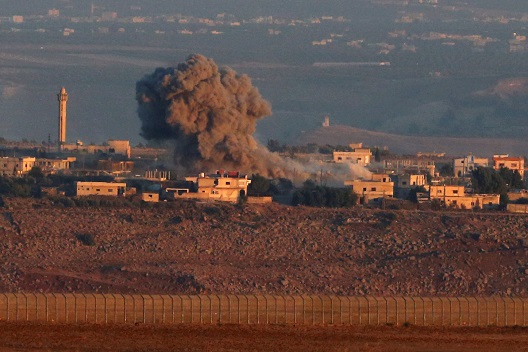 Tension continues to escalate along the Israeli-Syrian border with the recent regime southern offensive to oust opposition in the area and Israeli attacks on Iranian targets in Syria. Continued activity along the border is expected as Iran continues to solidify its hold on Syria. Yet Israel’s strategy is less clear as Iran continues to test the boundaries pushing Israel to act in Syria; among other actors like the Islamic State. We asked our nonresident senior fellows former Ambassador Frederic C. Hof, and Mona Alami about Israel’s current and potential involvement in the Syrian conflict as it develops.
Tension continues to escalate along the Israeli-Syrian border with the recent regime southern offensive to oust opposition in the area and Israeli attacks on Iranian targets in Syria. Continued activity along the border is expected as Iran continues to solidify its hold on Syria. Yet Israel’s strategy is less clear as Iran continues to test the boundaries pushing Israel to act in Syria; among other actors like the Islamic State. We asked our nonresident senior fellows former Ambassador Frederic C. Hof, and Mona Alami about Israel’s current and potential involvement in the Syrian conflict as it develops.
What is the overall Israeli strategy in Syria and what is Russia’s role?
FH: In my view, reliance on Russian assurances will be non-productive. Yes, Russian President Vladimir Putin is well-disposed toward Israel and its Prime Minister. But he lacks the intent and the capability to remove Iran from Syria entirely or keep it permanently away from the Golan Heights. Putin wants Israel to signal its explicit acceptance of the continued rule of Bashar al-Assad, arguing that an Assad-led Syrian state supported by Russia is the best guarantee against a continued prominent Iranian role in Syria. But the ground combat power deployed by Iran in Syria is essential to Assad’s continued rule, given the broken state of the Syrian army. Putin knows this and, for Putin, keeping Assad in power is essential for Russian domestic political considerations. Putin can neither remove Iran from Syria nor, in the long-run, prevent Iran and Hezbollah from establishing a new “resistance front” along the eastern base of the Golan Heights. He seeks Israel’s endorsement of Assad, but is in no position to meet Israel’s needs vis-à-vis Iran.
MA: First, Israel wants to maintain direct military and diplomatic channels with Russia to contain Iran in Syria and avoid clashes in the Syrian skies between the air force of the two countries. The policy has paid off. Russia’s Syria negotiator Alexander Lavrentyev said in an interview on Wednesday that Moscow convinced the Iranian forces in Syria to withdraw to at least 85 kilometers from the Israeli border. Secondly, Israel is gathering significant intelligence on Iran presence in Syria. In May, Israel struck over seventy Iranian positions in Syria. The targets were intelligence installations, rocket depots, army bases, logistic warehouses used by Iran. Third, Israel embarked on a gradual military campaign, which reached its peak in May. Israel has struck Iranian targets in Syria over 150 times in the last few years.
Read the rest on the MENASource blog.
Image: Photo: Smoke rises following an explosion at the Syrian side of the Israeli Syrian border as it is seen from the Israeli-occupied Golan Heights, Israel July 26, 2018. REUTERS/Ammar Awad
